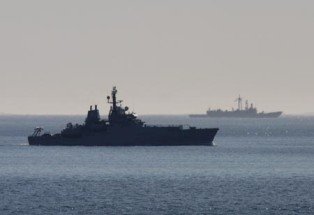Russia looks to buy more dolphins for combat use

Documents have been released in Russia indicating that the country’s military are looking to obtain and train dolphins for naval combat missions.
Reports suggest that the dolphins will take part in a new training programme and will be delivered before August to the Crimean port city of Sevastopol, which has housed a military dolphin training centre since 1965.
In July, 2014, Ukraine’s military leaders requested that Russia return 'its' dolphins, which fell into Russian hands when Crimea was annexed in March of the same year.
In 2012, the US navy announced that it would wind down its long running programme training dolphins to detect underwater mines.
Military dolphins' are confined in captivity, which can cause them extreme mental and physical stress and, as with other dolphins kept in marine parks and dolphinariums around the world, they live shorter lives than they would in the wild. They also suffer infections, gastric impaction (swallowing a foreign object), pneumonia, spinal fracture and drowning, and often die during military operations and exercises.
Source: http://us.whales.org/news/2016/03/russia-looks-to-buy-more-dolphins-for-combat-use

Documents have been released in Russia indicating that the country’s military are looking to obtain and train dolphins for naval combat missions.
Reports suggest that the dolphins will take part in a new training programme and will be delivered before August to the Crimean port city of Sevastopol, which has housed a military dolphin training centre since 1965.
In July, 2014, Ukraine’s military leaders requested that Russia return 'its' dolphins, which fell into Russian hands when Crimea was annexed in March of the same year.
In 2012, the US navy announced that it would wind down its long running programme training dolphins to detect underwater mines.
Military dolphins' are confined in captivity, which can cause them extreme mental and physical stress and, as with other dolphins kept in marine parks and dolphinariums around the world, they live shorter lives than they would in the wild. They also suffer infections, gastric impaction (swallowing a foreign object), pneumonia, spinal fracture and drowning, and often die during military operations and exercises.
Source: http://us.whales.org/news/2016/03/russia-looks-to-buy-more-dolphins-for-combat-use

